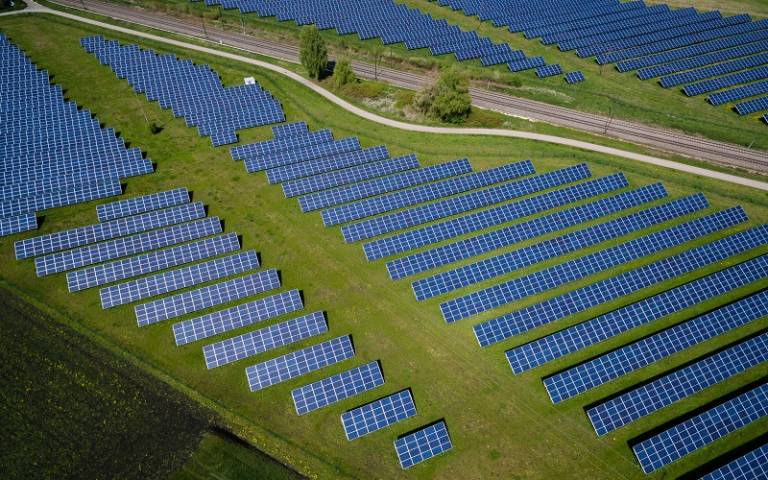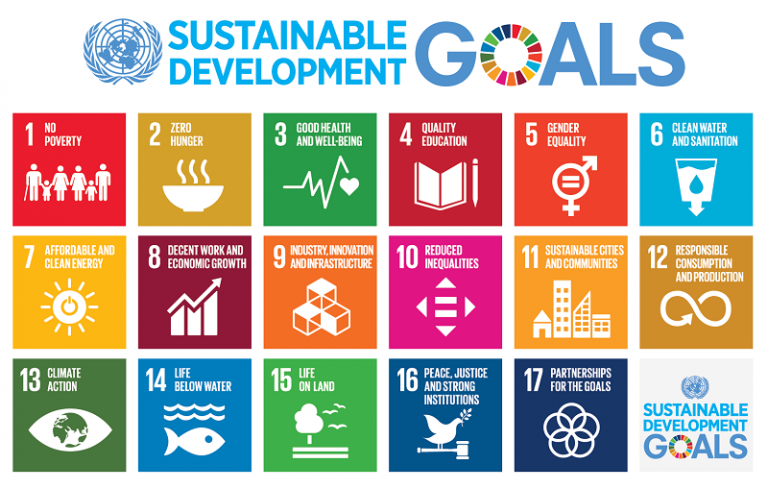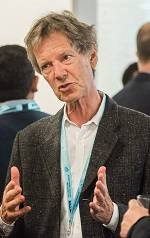Artificial Intelligence for Sustainable Development is an innovative new Master's launching in 2022. UCL Professor and UNESCO Chair of AI, John Shawe-Taylor, shares his insights into the programme.

John, can you tell us about the value of applying artificial intelligence (AI) to sustainable development?
When new technologies are developed, they’re typically taken over by high tech companies.
Businesses such as Google have shown how they can do useful things with AI and other technologies – and they do it very well – but their focus obviously relates to profits and the corporate side of things.
We have an opportunity to see how AI can contribute to global wellbeing too, and this is really exciting.
Is AI being used in sustainable development at the moment?
We’ve been running a module this year where we’ve been presenting some examples of AI in sustainable development, and there are many really inspiring examples.
One of them relates to distributing blood in Rwanda to women who are giving birth.
There has been a problem with many women dying in childbirth because blood supplies are difficult to deliver.
The solution was to build an automatic drone delivery system that uses AI technology in a number of ways, predominantly in the drone control systems.
So now, if there’s an urgent need for blood, people can use a mobile phone to request the blood type needed.
Then 15 minutes later, it drops out of the sky on a parachute from a drone.
Maternal death rates have fallen significantly since this was introduced.
Food production is a hot topic at the moment. Is there anything AI can do to support this?
AI has a lot of potential to improve productivity in agriculture, while lowering the use of resources at the same time.
One of these concepts is being developed in the Netherlands, where they have created an AI controlled environment to grow tomatoes.
AI is being used in a number of ways, including modelling all the interventions such as the optimum amounts of nutrients, water and light the tomatoes need.
They’re also using drones to get rid of pests. As a result, they are producing 40 times more tomatoes compared to a classical tomato growing operation in Spain, and using half the amount of water too.
There are so many areas in which AI can support the more careful control of resources, interventions and processes.
What are the challenges of using technology for sustainable development?
It’s sometimes the case that if you come to the table with technology as a sustainable development solution, you’re viewed as suspect.
Some people have a view that technological solutions are not appropriate for addressing sustainability.
For example, some people might say that the only way to solve climate problems is to stop driving cars.
Any alternative where technology might allow us to drive cars in a more sustainable way can be viewed as getting people off the hook from making significant changes to their lifestyles.
There can be an instinct to round on these dreadful consumers who are using all our resources.
I think turning these kinds of issues into a conflict is not very constructive.
I think it’s much more creative to say: “we need to tackle this problem – is there something technology can do to help?”
UCL has a strong reputation in AI across the world. Is there a defining moment for this that stands out in your mind?
AI is a hot topic, and it’s true that UCL’s been at the heart of it in some respects, with various breakthroughs that have helped to put it on the world’s agenda.
One of the iconic moments was when the global champion Go player, Lee Sedol, was defeated in the AlphaGo match.
I think perhaps we weren’t even aware of what a significant moment it was at the time.
The game, Go, is such a tradition across Asia, and people have a whole culture and philosophy around what it means to play Go.
The principle research scientist of AlphaGo, which was developed by DeepMind – now owned by Google – is the UCL Professor David Silver.
More than 200 million people around the world watched the matches between Lee Sedol and AlphaGo, and there was total shock that AI could beat a human in the game.
This is a moment that transformed the world’s understanding of what AI can do.
What learning opportunities do students have on the Artificial Intelligence for Sustainable Development MSc?
This Master’s programme gives students solid technical skills in AI, and focuses this knowledge on applying it to solving problems that can be of significant benefit to humanity.
It’s an expert AI Master’s, so students do need to come in with backgrounds in computer science, mathematics, or something else that’s related.
This is unlike any other Master’s out there, as students will be able to explore the potential of using AI to address the UN Sustainable Development Goals (SDGs).
After gaining the core skills they need in AI, students move onto project work, where they can tackle challenges and problems that haven’t been solved yet, and make a start on developing solutions.
The project component of the programme runs for three months. Students will work in collaboration with a stakeholder – which could be an organisation or a company – helping them with a challenge they are facing that relates to sustainable development.

Tell us about the types of stakeholders students may be able to work with.
It depends on each student’s area of interest, but we have a number of strong links with organisations and industry more generally, which students may want to take advantage of. It could even be an organisation in a developing country.
We have links with a number of centres in Africa, and I actually run a charity called the Knowledge 4 All Foundation, which is helping a network of AI practitioners and researchers in Sub-Saharan Africa.
We’ve managed to get some funding for what we’re calling micro-projects, so we’re funding groups in Africa to develop data sets, or to try to apply AI to different sustainability challenges.
I can foresee some of these groups having challenges that students might be able to get involved in through the Master’s.
A lot of our Master’s graduates from UCL Computer Science – as well as other colleagues across UCL – go on to set up their own start-ups, so there can be opportunities for our Master’s students to work with them on a challenge for their project work too.
Are there any AI-sustainability start-ups from UCL that you are particularly excited by?
A company called Carbon Re was launched with UCL support, with the purpose of reducing the carbon footprint of cement production.
Producing cement creates a huge amount of carbon dioxide emissions, and research from UCL has found a way to use AI to identify the optimal processes for the lowest possible carbon dioxide use and fuel use. Carbon Re was set up as a company as a result, and they are also looking at using similar technology in other energy intensive trades.
What jobs and employers might graduates of this programme go towards?
There is currently a real movement towards sustainable development start-ups, with huge resources and venture capital going into them, so I expect to see more and more graduates going in that direction.
In general, graduates from this programme are prime employees for companies that are specifically targeting sustainable development goals.
With the core AI skills students gain from this degree, they could go into any AI related role in any sector to apply their skills.
But for those who want to go into AI for sustainable development, there will be increasing opportunities across all industries too.
Through my work as the UNESCO Chair of Artificial Intelligence at UCL, we’re looking at the application of AI in sustainable development.
We have discussions with all sorts of companies such as Amazon, who are interested in future-proofing themselves and building their capabilities in this area.
This is a very exciting time for our students and graduates. Wherever they go onto after this programme, they’ll certainly take a sustainable philosophy and approach with them.
 Close
Close


